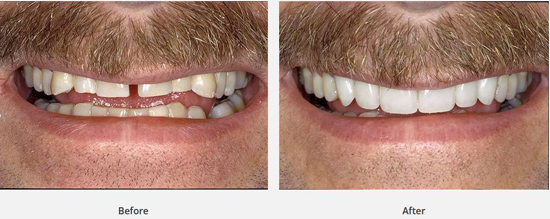My dentist placed four new crowns on my front teeth. Two crowns got rid of a gap between my center front teeth, and my dentist added two more crowns to even out my smile so the center teeth would not look too large. Since getting the crowns, my mouth does not close correctly, and I have trouble pronouncing some words, like words that begin with “tr.”
Also, my mouth and lips are dry, and I have some neck and jaw pain. I’ve had the crowns for three months, and despite my dentist’s adjustments, I see no improvements. I prefer to go back to my gap because the crowns are so uncomfortable.
My dentist asked me to give him more time, But I am unsure what we are waiting for. So far, I do not have another appointment scheduled with him. What are my options? Thank you. Edgardo from TX
Edgardo,
Your description is a problem that requires the attention of a dentist with advanced training in occlusion and bite. Dentists who study occlusion and bite understand proper jaw function and how your upper and lower teeth should meet when you close your mouth or bite down.
When Dental Crowns Cause Speech Issues and Pain
When a dentist places new crowns, you begin to experience speech issues and neck and jaw pain, so closing your gaps is not the issue. Usually, the problem is that your dentist opened your bit too far.
Several issues can create a bite that opens too far:
- Crowns are too thick
- Crowns are too long
Symptoms from Poor-Fitting Crowns
Poor-fitting crowns can prevent proper mouth closure and neck and jaw pain.
- Lip incompetence – When your lips cannot close naturally without effort, it can lead to dry mouth. And as saliva production decreases, bacteria breeds And black buildup leads to tooth decay.
- Jaw and neck pain – Upper and lower teeth that do not meet cause jaw strain. Repeated stress results in neck and jaw pain.
Get a Second Opinion for Your Dental Crowns
Schedule an appointment with a dentist who has advanced training in occlusion and bite. Your neck and jaw pain should resolve with new crowns that fit well. Otherwise, if your symptoms continue, the National Institutes of Health’s brochure on temporomandibular joint (TMJ) disorder recommends conservative treatment. A dentist may recommend a custom split to wear and night and help your jaw relax.
Duane Delaune, DDS, an cosmetic dentist of Metairie, New Orleans, sponsors this post.

Crowns that fit well prevent speech issues and jaw and neck pain.
Photos are of Dr. Delaune’s patient.
